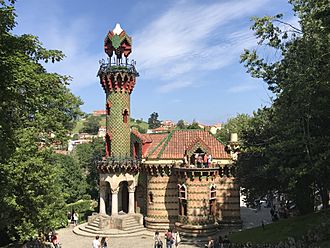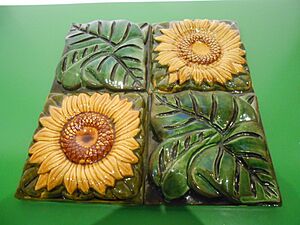El Capricho facts for kids
Quick facts for kids El Capricho |
|
|---|---|
 |
|
| General information | |
| Location | Comillas (Cantabria), Spain |
| Design and construction | |
| Architect | Antoni Gaudí |
| Official name: Villa El Capricho | |
| Type: | Non-movable |
| Criteria: | Monument |
| Designated: | 24 July 1969 |
| Reference #: | RI-51-0003828 |
El Capricho is a beautiful villa located in Comillas, a town in Cantabria, Spain. It was designed by the famous architect Antoni Gaudí. This unique house was built between 1883 and 1885. It was meant to be a summer home for a rich person named Máximo Díaz de Quijano. Sadly, he passed away a year before the house was even finished.
Gaudí is well-known for his amazing buildings, mostly in Catalonia. However, he also worked on a few projects outside that region, including some in Comillas. For example, he helped another architect, Joan Martorell, with a different summer house called the Palacio de Sobrellano.
El Capricho shows Gaudí's early style, sometimes called his "orientalist period." This means he was inspired by designs from places like the Middle East and Asia. The building is a great example of Modernisme, an art and architecture style that was popular in Spain. It even hinted at the Art Nouveau style that became popular across Europe later on. The tower of El Capricho looks a bit like a minaret, which is a tall tower found on mosques. After Máximo Díaz de Quijano died, the villa was used as a summer getaway for important and wealthy people.
Over time, especially after the Spanish Civil War, the building started to fall apart. Even though it was declared a National Monument in 1969, it remained in poor condition. In 1977, the last family member who owned it sold the property. It was then carefully fixed up and opened as a restaurant in 1988. Finally, in 2009, El Capricho became a museum, so everyone can now visit and enjoy Gaudí's incredible design.
Contents
Discovering El Capricho's Design
El Capricho is one of the many amazing buildings created by the respected architect Antoni Gaudí. In this project, Gaudí showed how much he knew about solving design problems. He also combined different architectural styles in a way that was both historical and uniquely his own.
The Unique Tower of El Capricho
The tower of El Capricho is covered with lovely ceramic tiles. These tiles are bright yellow sunflowers mixed with subtle green leaves. The very top of the tower has an arabesque design, which is a fancy pattern often seen in Islamic art. At the bottom of the tower, four classical columns help hold up the heavy structure. These bright white columns stand out against the red brick and colorful tiles of the building. Above the columns, there is a balcony. From here, visitors can look out at the landscape and see the detailed tiles up close. A steel spiral staircase inside the tower leads even higher, offering a fantastic view of Comillas.
Exploring the House's Features
The house itself has three floors. You can tell the floors apart by the materials used on the outside. The basement is made of large stone bricks. The main floor uses smaller red bricks. The top floor, or attic area, is easy to spot because of its beautifully sloped roof and ceramic tiles. The house is not very big, but it has many different rooms and functions to meet the needs of its original owner.
Gaudí also included many large windows in the house. This allows plenty of natural light to come inside. Interestingly, Gaudí was inspired by Gothic architecture when designing the windows. He used pointed arches to frame them. This is another example of how Gaudí brought together ideas from different cultures and building styles into his work.
El Capricho was built on the edge of Comillas, surrounded by the countryside. This location was chosen so that its owner could have a peaceful escape from the busy city life.
See also
 In Spanish: El Capricho (Gaudí) para niños
In Spanish: El Capricho (Gaudí) para niños
 | Charles R. Drew |
 | Benjamin Banneker |
 | Jane C. Wright |
 | Roger Arliner Young |


